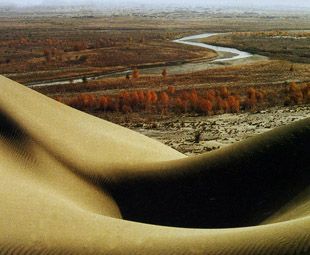| Home / Environment / Photo News | Tools: Save | Print | E-mail | Most Read |
| 18.7b Yuan Earmarked to Fight Desertification in Xinjiang |
| Adjust font size: |
The investment is earmarked to prevent the further expansion of the The money will be spent building forest belts around cities and oasis areas, upgrading irrigation facilities, setting up monitoring stations and training professional staff, said Ismail Tiliwaldi, chairman of the region. The central government will cover 80 percent of the total investment, and the remaining 20 percent will be financed by the regional government, he said, adding that the aim is to cut the desert area by 7.6 million hectares by 2015. Xinjiang is among Chinese regions most affected by desertification. Statistics from the regional government show 75 million hectares of the region's land, or 45 percent of its total, is desert. At least 12 million people suffer the consequences, ranging from drinking water shortages to cropland infertility. Before the 1980s, residents of Qira county on the southern edge of "The desert is expanding less rapidly now. We have managed to reduce the speed of expansion from 38,400 hectares a year to 10,400 hectares a year, but the situation is still very severe," Tiliwaldi said. Earlier reports say excessive herding and farming has worsened soil erosion and desertification in the region. An official with the regional water resources administration said irrational human activities have undermined the government's soil conservation efforts. Zhang Funian, an engineer in the region's rural resources work station, said residents in Since 2003, the county has invested about 200 million yuan (about US$26 million) to install methane gas facilities to prevent people from cutting down any more trees. Local residents are also being encouraged to plant trees that resist desertification, such as poplars, desert dates and sea buckthorns, Zhang said. Xinjiang has worked with countries including In 2006, Statistics from the State Forestry Administration show (Xinhua News Agency July 11, 2007) |
| Tools: Save | Print | E-mail | Most Read |
 |
| Related Stories |
|
||||
